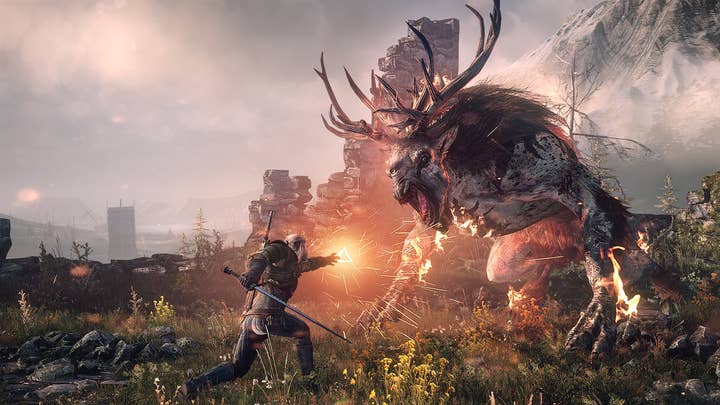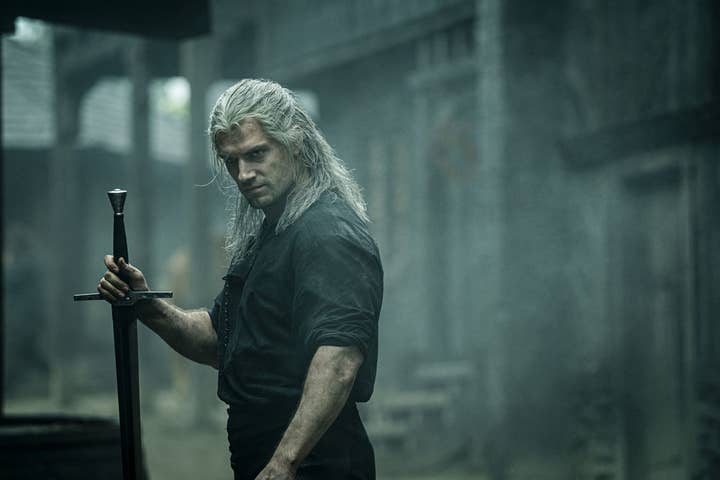The Witcher heralds an era of game IPs on TV | Opinion
As media giants prepare to do battle over streaming, well-known IPs are a potent weapon -- and videogames remain the last great untapped source
Netflix, it appears, intends to toss rather more than a coin to its witcher. The streaming service has never been shy in bragging about successes, but it has been dramatically bullish about the success of The Witcher even by its own standards.
Some of the company's claims about The Witcher deserve to be taken with a pinch of salt -- its sky-high viewer numbers for the first season, for example, are based on a count of people who watched at least two minutes of the show, a length of time which wouldn't even get you to the opening credits of the first episode. Netflix claims that this new way of measuring viewership puts it in line with other companies in the industry, which leads one to wonder slightly about its executives' childhoods, because I had previously thought that "and if the other kids were jumping off a cliff, would you do that too?" parental admonishment was quite a universal one.
Some things, however, speak to a genuine belief in The Witcher's success in a way that no amount of public boasting ever could -- such as the company's commitment to more seasons of the show and its apparent commissioning of an animated spin-off movie to fill the gap before the next full season of TV arrives next year. Also hard to fake is the sudden surge in demand for the previously rather obscure book series which has resulted in a gigantic reprinting run, and the enormous enthusiasm for the show online is no doubt genuine as well. The Witcher is a bona fide phenomenon, no matter how uncomfortable mental gymnastics with viewership numbers may make you.
"The Witcher has -- up until now -- primarily been a game property, with many players probably not aware that a novel series exists"
That success is a pretty important milestone, because while it's true that The Witcher is adapting a series of novels, it's undeniable that most of the pre-release buzz and built in anticipation that allowed this show to become such an enormous hit so quickly came not from the books but from CD Projekt Red's massively popular series of games. The novels, while hardly a flop, have largely enjoyed a devoted niche following in Eastern Europe; the games are global mega-hits, especially the most recent instalment, The Witcher III: Wild Hunt, which has sold somewhere in the region of 20 million copies worldwide.
It's not unfair to say that in most markets around the world, The Witcher has -- up until now -- primarily been a game property, with many players probably not even aware that a novel series exists. This, in essence, makes The Witcher into the first hugely successful, premium TV show to build its success on a videogame-centric IP.
That's a big deal, because right now the world is filling up with TV streaming services with enormous financial backing, and each of those services knows that to carve out a place in what will become an increasingly cutthroat business, they need content. From Disney and Netflix to HBO and Warner, from CBS and NBC to any number of regional hopefuls in major content markets around the world, not to mention Amazon and Apple, billions and billions of dollars are currently being poured into war-chests to find the next big, broad-appeal IP that will fuel water-cooler discussions and drive subscription uptake.
Some studios are better established than others for this battle. Disney's ownership of Marvel and Star Wars gives it a bit of a head-start, as The Mandalorian showed, but other studios aren't being slow about resurrecting old properties (like CBS' Star Trek) or whipping out their chequebooks for new ones, like Amazon's snapping up of Lord of the Rings or HBO's (against-all-odds excellent) Watchmen miniseries.
It's not that these companies can't create genuinely original TV shows -- they have done, and in some cases the results have been excellent. In this kind of no-holds-barred battle, though, an IP that comes with a built-in fanbase is a very special kind of weapon; it earns you instant hype, free word-of-mouth and, to some degree, the audience trust and patience required to do interesting things in the show from the outset. The problem, however, is that there aren't so many great IPs like that just sitting around out there -- hence why big bucks have been paid out to use even properties that were very recently adapted (Lord of the Rings) or outright controversial to touch (Watchmen).
"The world is filling up with TV streaming services with enormous financial backing, and they need content"
Books, of course, are the stalwart source of material for TV, and that hasn't changed. The Handmaid's Tale and Altered Carbon are two seriously successful book adaptations of the past couple of years that spring to mind, but ever since Robert Downey Jr. announced that he was Iron Man, comic books have also been a rich vein for TV executives to mine, from the obvious candidates (American TV is filled with DC Comics based shows, and Disney+ will soon fill with Marvel ones) to the somewhat more obscure shows like Amazon's The Boys, AMC's Preacher and Netflix' upcoming Locke & Key.
Games are, in a sense, the last great untapped well of IP in the era of premium television. To some degree that might just be because games are trickier to adapt; books and comics follow an internal episodic structure and rules of dialogue and character that lend themselves to being interpreted as a TV show relatively well. Games don't necessarily do that, or perhaps more realistically, the process of adapting a game to TV simply isn't a well-trodden path and there aren't as many scriptwriters who could do so deftly.

Games face other issues, too. Television executives are often of a generation a bit too old to have grown up as gamers (though that's a barrier being eroded year by year) and the core appeal of a game and its world, characters and story is something that requires a lot more time and effort to explain than just thrusting a comic book into someone's hands. Looming over all of this is the sense many older executives have, hugely outdated as it may be, that games are essentially the preserve of children and teenage boys -- a good market, but not one that makes a lot of decisions about streaming service subscriptions.
"There will undoubtedly be many attempts in the coming years to turn popular games into premium TV shows"
The Witcher is no doubt already doing a lot to overturn all of those barriers. The fact that a series based on an IP with an existing appeal almost entirely down to a game franchise is even being mentioned in the same breath as The Mandalorian -- let alone credibly being said to have be more popular -- ought to be opening eyes and minds around boardroom tables in many big companies. That the hunt for the "next Game of Thrones" seemingly ended up finding it in a videogame is potentially a defining moment for the relationship between the game and TV industries -- it should have companies scrambling to see what else is out there that could possibly work as a premium TV show.
They shouldn't have to look far, because there are dozens of game franchises that fit the bill admirably. The adaptation process would not be uncontroversial, but it's easy to imagine any number of major game properties being translated into hugely popular fantasy or science fiction shows -- from fantasy IPs like The Elder Scrolls or Dragon Age, through alternate history epics like just about any of the Assassin's Creed games, space operas like Mass Effect, post-apocalyptic drama like The Last of Us or Fallout.
Each of these, and many more, have the potential to do for an adapted show what The Witcher games did for Netflix' latest hit -- which, lest we forget, managed to stir up enormous anticipation and hype merely off the back of a teaser image of Henry Cavill in what is, honestly, quite a dodgy wig.
There will undoubtedly be many attempts in the coming years to turn popular games into premium TV shows, and not all of these efforts will turn out well. There's going to be a steep learning curve along the way as creators figure out what the connective tissue between these mediums should be, and where the scalpel needs to be applied more harshly. We saw the same process, warts and all, as comic books started being adapted into TV shows and movies.
There will be some pain points for games, too, but The Witcher has made it clear to everyone; this is a vein of IP that the media giants limbering up for a high-stakes battle over the future of streaming entertainment simply cannot afford to ignore.

